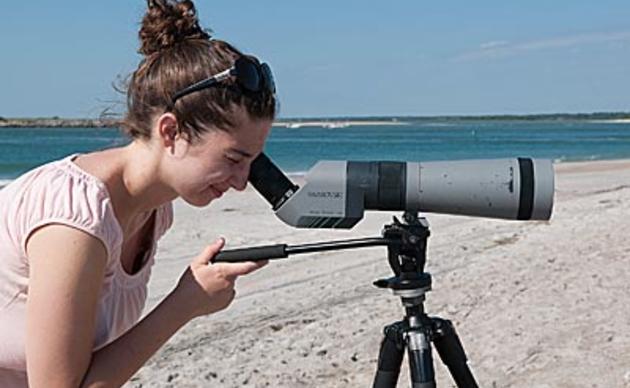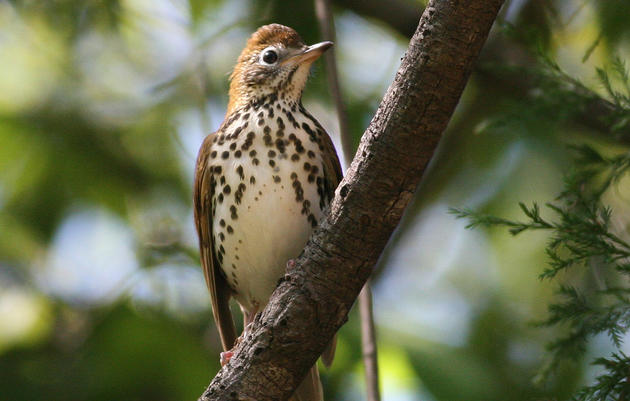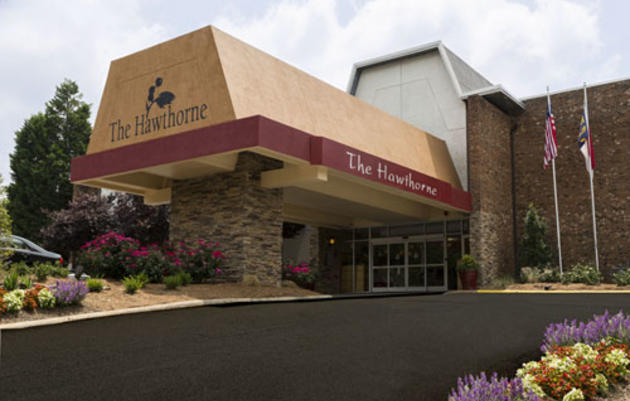Annual Meeting Program
The Annual Meeting is right around the corner! Start planning your perfect weekend with our program detailing the many Annual Meeting Field Trips and Educational Sessions offered throughout the weekend.
PRO TIP: Open the program in a new window or print our program planner to help you plan the perfect weekend.
The Art of Birding
2016 Audubon North Carolina Annual Meeting
Hosted by Forsyth Audubon
Hawthorne Inn & Conference Center
Winston-Salem, North Carolina
May 13-15, 2016
Schedule of Events
FRIDAY, MAY 13
- Audubon Ambassador Training - 10:00 am - 3:00 pm
- Friday Evening Reception - 5:30-7:00 pm
- Dinner on Your Own
A generous thank you to our beverage sponsors Raffaldini Vineyards and Winery and Foothills Brewing. Consider visiting these establishments during your stay in Winston-Salem.
SATURDAY, MAY 14
- Pick Your Field Trips and Educational Sessions.
- Field Trips are First Come, First Served and will be taken off the registration site when filled.
- Full Day Sessions
- Morning Half Day Sessions
- Afternoon Sesssions
- Cocktail Reception - 6:00 - 7:00 pm
- Awards Banquet - 7:00 - 10:00 pm
SUNDAY, MAY 15
- Half Day Field Trips - 7:45 am - 12:00 Noon
FRIDAY, MAY 13
Audubon Ambassadors Training
10 a.m. – 3 p.m.
Learn more about becoming an Audubon Ambassador in this innovative program. You MUST register for this session at climate.nc.audubon.org/ambassadors.
Friday Evening Reception
5:30 – 7 p.m.
Join our hosts, Forsyth Audubon, for a reception at the Artworks Gallery and the Unleashed Arts Center in the downtown arts district in Winston-Salem. Stroll between the galleries while you enjoy complimentary hor d’oeuvres, beer and wine. Then head out with friends for dinner on your own at one of the many popular Winston-Salem restaurants, many within walking distance.
Dinner on your own.
SATURDAY, MAY 14
When planning your Saturday trips there are 2 ways to go:
1. Pick one of the two full-day birding trip options
OR
2. Pick from the morning and afternoon options
See our Saturday and Sunday planner at the end of this document to help you plan the perfect birding weekend!
Full-Day Birding Trips
Trip 1 -- Pilot Mountain State Park
Departs at 7:30 a.m. and returns at 4 p.m.
- Approximate drive time: 45 minutes
- Easy to moderate walking
- Restrooms available
- Bring snacks, water and lunch
- Limit: 16 participants
This gem is located about 20 miles north of Winston-Salem just off US Hwy. 52. There are restrooms, picnic areas, camping and hiking trails. The park is comprised of two parts, the mountain and the river section, with a 6-mile connecting trail. We will begin the trip on the southern section of the park that borders the Yadkin River. Bald Eagles have nested near the southeast corner of the park since 2006. Ospreys, herons and cormorants may be seen on the river. Forsyth Audubon partnered with Audubon’s International Alliances Program and scientists from the Smithsonian Institution in a project to determine the migration pathways and wintering grounds for our Wood Thrushes. GPS locator tags and bands were attached to 17 Wood Thrushes captured in this section of the park in 2014. In 2015, two birds were re-captured, and we found that one of them wintered in Belize. Then we will drive to the top of the mountain and take the trail to Little Pinnacle overlook. It is the site of fall hawk watches and has a commanding view of the surrounding area. Hawks, vultures and Common Ravens make their home on Pilot Mountain, along with numerous smaller birds. Other birds likely to be observed on this trip are Yellow-billed Cuckoo, Pileated Woodpecker, Acadian Flycatcher, Blue-headed Vireo, Ovenbird, Louisiana Waterthrush, Northern Parula and Scarlet Tanager. (NCBT: NW Piedmont Group – Site 6)
Trip 2 -- Blue Ridge Parkway
Departs at 7:30 a.m. and returns at 4 p.m.
- Approximate drive time: 1 hour to the Parkway
- Easy to moderate walking
- Limited restrooms available
- Bring snacks, water and lunch
- Limit: 16 participants
This trip will focus on birds, but there will also be opportunities to observe butterflies and wildflowers. The route is along NC Hwy. 21 up the escarpment through Roaring Gap to the Blue Ridge Parkway. A stop at Little Glade Mill Pond at Milepost 230 should yield tanagers, orioles and warblers in the hardwoods on either side of the parkway. The next stop is Mahogany Rock where hummingbirds, Indigo Bunting, Chestnut-sided, Black-throated Green and Black-throated Blue Warblers, Common Yellowthroat and Yellow-breasted Chat may be found. We will also stop at Basin Creek at the south side of Doughton Park and look for Hooded and Worm-eating Warblers, American Redstart, Acadian Flycatcher, waterthrushes, and thrushes. The fields along Longbottom Road are good for hawks, Wild Turkey, Eastern Kingbird and Tree Swallow. (NCBT: Northern Blue Ridge Parkway Group – Sites 2 and 3)
Half-Day Birding Trips
MORNING OPTIONS (Choose One)
Trip 3 -- Miller Park
Departs at 7:45 a.m. and returns at 11 a.m.
- Approximate drive time: 10 minutes
- Easy walking on paved trails
- Restrooms available
- Limit: 16 participants
Miller Park is beloved by birders for hosting our only local colony of Yellow-crowned Night-Herons. These beautiful birds have been nesting at Miller Park for as long as anyone can remember. The Night-Herons arrive in April, so you are almost certain to see them on this trip. The activity at the playgrounds, ball fields and tennis courts doesn’t seem to bother the birds in the adjacent woods. A compact network of paved trails provides close views of birds in a mix of hardwoods and pine in bottomland, slope and upland habitat. Other birds commonly reported in May include Cooper’s and Red-shouldered Hawks, Hairy Woodpecker, Great Crested Flycatcher, Swainson’s Thrush, and various warblers. (NCBT: NW Piedmont Group – Site 2)
Trip 4 -- Civitan Park and Salem Lake
Departs at 7:45 a.m. and returns at 11:30 a.m.
- Approximate drive time: 15 minutes
- Easy walking
- Restrooms available at Salem Lake Marina
- Limit: 16 participants
Civitan Park contains a five-acre restored wetland. The paved Salem Creek greenway runs along one side of the wetland and parallels Salem Creek. This small city park, adjacent to Winston-Salem State University, is the only known nesting site in the county for Willow Flycatcher and Warbling Vireo. Yellow Warbler, Red-winged Blackbird and Orchard Oriole are likely to be here in May. This park also has a nice variety of wildflowers. Nearby, Salem Lake is a 365-acre reservoir that is Forsyth County’s largest body of water. An unpaved trail encircles the lake. Lingering waterfowl are likely to be found here, as well as songbirds along the wooded edges of the lake. A Purple Martin house at the marina provides an opportunity to see the birds up close. (NCBT: NW Piedmont Group – Site 1)
Trip 5-A -- Tanglewood Park
This trip will be repeated as 5-B Sunday
Departs at 7:45 a.m. and returns at 11:30 a.m.
- Approximate drive time: 20 minutes
- Mostly easy walking
- Restrooms available
- Limit: 16 participants
This beautiful 1200-acre park along the Yadkin River is one of Forsyth County’s top birding locations. Forsyth Audubon worked with Tanglewood Park to develop areas of native wildflowers and warm-season grasses in a meadow adjacent to the wetlands. The meadow has proved to be a boon to species such as American Goldfinch, Indigo Bunting and Common Yellowthroat. Purple Martins use a house in the meadow. Forsyth Audubon also helped develop the Yadkin River Nature Trail, a system of trails with interpretative signage that includes this area. Because of the park’s size and diversity of habitat, we should see a wide variety of birds. Prothonotary Warblers breed in the park, and other species frequently observed are Wood Duck, Green Heron, Yellow-billed Cuckoo, Barred Owl, Pileated Woodpecker, Acadian and Great Crested Flycatcher, Eastern Kingbird, Yellow-throated Warbler, Scarlet Tanager and Baltimore Oriole. There is a $2-per-car entrance fee. (NC Birding Trail: NW Piedmont Group – Site 5)
Trip 6-A -- Reynolda Gardens
This trip will be repeated as 6-B Sunday
Departs at 7:45 a.m. and returns at 11:30 a.m.
- Approximate drive time: 15 minutes
- Easy walking
- Restrooms available
- Limit: 16 participants
The grounds and trails around the former R.J. Reynolds estate are adjacent to and owned by Wake Forest University. Local birders consider Reynolda to be the best spring birding location for migrating warblers. It is also one of the best places in the county to find thrushes. In addition, Great Crested Flycatcher, Eastern Kingbird, Blue-gray Gnatcatcher, Scarlet Tanager, and both Blue and Rose-breasted Grosbeak are frequently observed at Reynolda in May. (NCBT: NW Piedmont Group – Site 3)
Trip 7 -- Black Walnut Bottoms
Departs at 7:45 a.m. and returns at 11 a.m.
- Approximate drive time: 20 minutes
- Easy walking
- Restrooms available after 10 a.m.
- Limit: 16 participants
Black Walnut Bottoms is located in Bethania, just north of Winston-Salem. Established in 1759, Bethania is the second of Forsyth County’s three Moravian settlements. Forsyth Audubon has worked with the Town of Bethania for several years to remove invasive plant species, and has established and maintained the border of wildlife-friendly native plants by the parking lot. In addition, Forsyth Audubon helped develop a trail guide for Black Walnut Bottoms, and frequently conducts bird surveys and walks there.
The Black Walnut Bottoms Trail is a 1.4-mile trail that begins at the Visitor Center and loops through the woods beside Muddy Creek, along the base of Walnut Bluff, then follows the edges of open fields. This diverse habitat provides a variety of birds year-round. eBird shows 80 species reported in May. Breeding birds include Red-shouldered Hawk, Blue-gray Gnatcatcher, Acadian Flycatcher, Common Yellowthroat, Yellow-billed Cuckoo, Indigo Bunting, Eastern Towhee and Wood Thrush.
The Black Walnut Bottoms walk will end at 11 a.m., so you have the option to walk another of Bethania’s four trails. For those who are interested, there is also the possibility of lunch at the nearby Muddy Creek Cafe.
AFTERNOON OPTIONS
First Session (Choose One)
1:00 p.m. – 2:30 p.m.
Option A: Emily H. Allen Wildflower Preserve “Friendship Garden”
Departs at 12:45 p.m. and returns to the hotel or Habitat for Humanity Education Center at 2:30 p.m.
- Approximate drive time: 15 minutes
- Moderate walking on sloping garden paths
- No restrooms available
- Limit: 30 participants
This garden’s extraordinary native plant collection includes many rare or botanically-significant specimens. The garden provides an outdoor classroom for students, researchers, individuals and groups; promotes landscaping with native plants; and offers a unique setting in which to appreciate native flora. This five-and-a-half acre preserve is home to roughly 500 species of wildflowers, ferns and trees, including 28 of the 32 Appalachian species of Trillium.
Emily Allen was inspired to start her “friendship garden” in 1961, when she found Showy Orchis growing on the creek bank. The discovery started her on a life-long mission to transform the site into the gem it is today. Since 2000, the preserve has been protected by a conservation easement donated by the Allen family to Piedmont Land Conservancy. In 2014, the family donated its title of the garden and the Allen residence to the Conservancy for use as an educational resource, so future generations can enjoy its beauty and learn from nature.
Among the plants in the garden are Bloodroot, Wake Robin, Flame Azalea, Large-flowered Trillium, Oconee Bells (a federally endangered species) and Virginia Bluebells.
Option B: “Climate Strongholds – Where Our Birds Need Long-term Protection”
Departs at 12:45 p.m. and returns at 2:30 p.m.
- Approximate drive time: 15 minutes
- Easy walking
- Restrooms available
- Limit: 20 participants
SPEAKERS:
- Curtis Smalling, Director Of Land Bird Conservation for Audubon North Carolina
- Greg Andeck, Senior Manager For Conservation Solutions for Audubon North Carolina
LOCATION:
- Habitat for Humanity of Forsyth County Education Center
- 1023 W. 14th Street, Winston-Salem, NC 27105
- Computer Lab
If you love maps and birds, this workshop is for you. Curtis will share which Important Bird Areas in North Carolina are most critical for birds’ long-term survival based on the Audubon Birds and Climate Change Report models. Greg will give practical tips for members to advocate for long-term protection of the strongholds. This session will be in a computer lab, and everyone will be able to zoom in on their own community and favorite Important Bird Areas.
Option C-1: “How You Can Help Create the World’s Largest Bird Sanctuary”
This option will be repeated as Option C-2 at 2:45 p.m.
Departs at 12:45 p.m. and returns at 2:30 p.m.
- Approximate drive time: 15 minutes
- Easy walking
- Restrooms available
- Limit: 30 participants
SPEAKER:
- Kim Brand, Bird-Friendly Communities Coordinator, Audubon North Carolina
LOCATION:
- Habitat for Humanity of Forsyth County Education Center
- 1023 W. 14th Street, Winston-Salem, NC 27105
- Upper Level Conference Room
From your own yard to your community, you can make a difference for your resident birds and migrating visitors that stop over on their long journeys. Learn how to help birds right away by choosing native plants that provide the food they need. Get a look at the brand-new Audubon yard signs and find out how to get one; show your neighbors and friends how much you care about birds! Learn how to build partnerships like the one Forsyth Audubon has created with Habitat for Humanity of Forsyth County, and take a quick tour of the bird-friendly plantings on the campus. If time allows, we’ll visit the bird-friendly yard of some nearby Habitat for Humanity homeowners.
Second Session (Choose One)
3:00 p.m. – 4:30 p.m.
Option C-2: “How You Can Help Create the World’s Largest Bird Sanctuary”
Repeat of Option C-1
Departs at 2:45 p.m. and returns at 4:30 p.m.
- Approximate drive time: 15 minutes
- Easy walking
- Restrooms available
- Limit: 30 participants
SPEAKER:
- Kim Brand, Bird-Friendly Communities Coordinator, Audubon North Carolina
LOCATION:
- Habitat for Humanity of Forsyth County Education Center
- 1023 W. 14th Street, Winston-Salem, NC 27105
- Upper Level Conference Room
From your own yard to your community, you can make a difference for your resident birds and migrating visitors that stop over on their long journeys. Learn how to help birds right away by choosing native plants that provide the food they need. Get a look at the brand-new Audubon yard signs and find out how to get one; show your neighbors and friends how much you care about birds! Learn how to build partnerships like the one Forsyth Audubon has created with Habitat for Humanity of Forsyth County, and take a quick tour of the bird-friendly plantings on the campus. If time allows, we’ll visit the bird-friendly yard of some nearby Habitat for Humanity homeowners.
Option D: “How You Can Help Chimney Swifts – the 2016 Bird of the Year”
Departs at 2:45 p.m. and returns at 4:30 p.m.
- Approximate drive time: 15 minutes
- Easy walking
- Restrooms available
- Limit: 45 participants
SPEAKER:
- Curtis Smalling, Director Of Land Bird Conservation for Audubon North Carolina
LOCATION:
- Habitat for Humanity of Forsyth County Education Center
- 1023 W. 14th Street, Winston-Salem, NC 27105
- Lower Level Conference Room
Over the past century, Chimney Swifts have been extremely adaptable: As their natural roosting sites—large hollow trees and caves—disappeared, Chimney Swifts learned to roost in urban chimneys. Still, their populations have decreased steeply (53 percent between 1966 and 2007 in the United States) as chimneys are capped or removed, leaving fewer places for swifts to nest and raise their chicks. Chimney Swifts are now listed as “near threatened.”
This workshop will include the many fun quirks that make Chimney Swifts cool and surprising. More importantly, you will learn specific ways to help these unique birds, including keeping your chimney open, becoming a citizen scientist, constructing a chimney swift tower, and advocating for preservation of important chimneys in your community.
Audubon North Carolina Reception
Poolside at the Hawthorne Inn 6:00 p.m. – 7:00 p.m.
Come relax and share the sightings of the day with your fellow birders around the pool at this wine and beer reception hosted by Audubon North Carolina.
Banquet Awards Dinner
7:00 p.m. - 10:00 p.m.
Join us for a buffet dinner and presentations by Heather Hahn, Executive Director, Audubon North Carolina and Gary Langham, Chief Scientist of the National Audubon Society, and view a short film created by Forsyth Audubon. The evening will end with our awards presentations in the categories of Honorary Warden, BirdLore Conservation Award and Volunteer of the Year.
SUNDAY, MAY 15
Half-Day Field Trips (Choose One)
Trip 8 -- Historic Bethabara Park
Departs at 7:45 a.m. and returns at Noon
- Approximate drive time: 20 minutes
- Easy walking on paved greenway and trails
- No restrooms available
Naturalist Katherine Thorington, Ph.D., will share the natural history of Historic Bethabara Park, a National Historic Landmark. In 1753, a small group of Moravians settled this beautiful spot. A restored 1788 church, archaeological ruins, a reconstructed village, colonial medicinal gardens, and a fort dating to the French and Indian War remain on-site. This location is a long-time favorite of local birders for its wide variety of habitats. Its 20-mile system of nature trails follows South Monarcas and Mill creeks, and goes through woods and a power cut and along the edges of a wetland. eBird shows 123 species for Bethabara during May including Wood Duck, Barred Owl, Pileated Woodpecker, Acadian Flycatcher, Great Crested Flycatcher, White-eyed Vireo, Wood Thrush and a variety of warblers. Breeding bird censuses at Bethabara in 2009 and 2010 identified 20 Wood Thrush territories. (NCBT: NW Piedmont Group – Site 4)
Trip 5-B -- Tanglewood Park
Repeat of Trip 5-A, Saturday Morning
Departs at 7:45 a.m. and returns at 11:30 a.m.
- Approximate drive time: 20 minutes
- Mostly easy walking
- Restrooms available
- Limit: 16 participants
This beautiful 1200-acre park along the Yadkin River is one of Forsyth County’s top birding locations. Forsyth Audubon worked with Tanglewood Park to develop areas of native wildflowers and warm-season grasses in a meadow adjacent to the wetlands. The meadow has proved to be a boon to species such as American Goldfinch, Indigo Bunting and Common Yellowthroat. Purple Martins use a house in the meadow. Forsyth Audubon also helped develop the Yadkin River Nature Trail, a system of trails with interpretative signage that includes this area. Because of the park’s size and diversity of habitat, we should see a wide variety of birds. Prothonotary Warblers breed in the park, and other species frequently observed are Wood Duck, Green Heron, Yellow-billed Cuckoo, Barred Owl, Pileated Woodpecker, Acadian and Great Crested Flycatcher, Eastern Kingbird, Yellow-throated Warbler, Scarlet Tanager and Baltimore Oriole. There is a $2-per-car entrance fee. (NC Birding Trail: NW Piedmont Group – Site 5)
Trip 6-B, Reynolda Gardens
Repeat of Trip 6-A, Saturday morning
Departs at 7:45 a.m. and returns at 11:30 a.m.
- Approximate drive time: 15 minutes
- Easy walking
- Restrooms available
- Limit: 16 participants
The grounds and trails around the former R.J. Reynolds estate are adjacent to and owned by Wake Forest University. Local birders consider Reynolda to be the best spring birding location for migrating warblers. It is also one of the best places in the county to find thrushes. In addition, Great Crested Flycatcher, Eastern Kingbird, Blue-gray Gnatcatcher, Scarlet Tanager, and both Blue and Rose-breasted Grosbeak are frequently observed at Reynolda in May. (NCBT: NW Piedmont Group – Site 3)
Meeting Adjourns
Related
The BEST Weekend of Your Year
The Audubon NC Annual Meeting is packed with birdy goodness
Explore Winston-Salem
Explore Winston-Salem during the Audubon North Carolina Annual Meeting.
2016 Annual Meeting Accommodations
Book your room at the Hawthorne Inn & Conference Center
How you can help, right now
Donate to Audubon
Help secure the future for birds at risk from climate change, habitat loss and other threats. Your support will power our science, education, advocacy and on-the-ground conservation efforts.
Sign Up For Our eNewsletter
Keep up-to-date on all that happens with Audubon North Carolina's research, events and volunteer opportunities.







